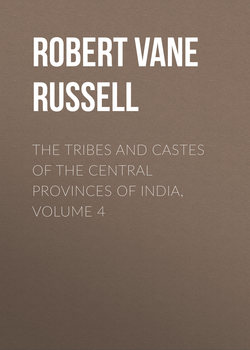Читать книгу The Tribes and Castes of the Central Provinces of India, Volume 4 - Robert Vane Russell - Страница 116
Part II
Articles on Castes and Tribes
Kumhār—Yemkala
Vol. IV
Mahār
8. Names
ОглавлениеA child is named on the seventh or twelfth day after its birth, the name being chosen by the Mohtūria or caste headman. The ordinary Hindu names of deities for men and sacred rivers or pious and faithful wives for women are employed; instances of the latter being Ganga, Godāvari, Jamuna, Sīta, Laxmi and Rādha. Opprobrious names are sometimes given to avert ill-luck, as Damdya (purchased for eight cowries), Kauria (a cowrie), Bhikāria (a beggar), Ghusia (from ghus, a mallet for stamping earth), Harchatt (refuse), Akāli (born in famine-time), Langra (lame), Lula (having an arm useless); or the name of another low caste is given, as Bhangi (sweeper), Domari (Dom sweeper), Chamra (tanner), Basori (basket-maker). Not infrequently children are named after the month or day when they were born, as Pusau, born in Pus (December), Chaitu, born in Chait (March), Manglu (born on Tuesday), Buddhi (born on Wednesday), Sukka (born on Friday), Sanīchra (born on Saturday). One boy was called Mulua or ‘Sold’ (mol-dena). His mother had no other children, so sold him for one pice (farthing) to a Gond woman. After five or six months, as he did not get fat, his name was changed to Jhuma or ‘lean,’ probably as an additional means of averting ill-luck. Another boy was named Ghurka, from the noise he made when being suckled. A child born in the absence of its father is called Sonwa, or one born in an empty house.
